Backlash forces government’s hand on defined benefits: expert

The release of regulations around the proposed Division 296 tax was “deliberate” after backlash from the Australian Council of Public Sector Retiree Organisations (ACPSRO), says a leading industry figure.
Aaron Dunn, chief executive of Smarter SMSF, said in the most recent SMSF Adviser podcast that the Coalition has been forthright over the past few months in asking questions of the government about how the proposed super tax legislation will apply to the public sector.
“It’s worth noting, of course, that the Prime Minister has a defined benefit income stream, and the framework which we had from the current bill really didn’t discuss how it was going to relate to defined benefit pensions,” Dunn said.
“Now the regulations start to give us some context in terms of how these laws would apply, and ultimately, trying to determine a valuation every year for the purposes of trying to determine whether Division 296 tax applies or not.”
Earlier this month, ACPSRO stated that having studied the proposed regulations, its view is that defined benefit pensions “are not in receipt of the several concessions that apply to funds accumulated under the superannuation guarantee arrangements and therefore should not be included within the ambit of the proposed legislation”.
Dunn added that separate to that issue is a mechanism in terms of when Division 296 would need to be paid because in a defined benefit scheme, superannuation is locked in growth until the member moves into retirement phase.
“There is an approach in a similar guise to, in essence, the family law requirements and calculation for defined benefit income streams being applied here,” he said.
“For me, what’s starting to come out is not only the concerns that we’ve had about the policy and how it works, and the fairness with the way in which this will be calculated, but this challenge of fairness is also coming from cohorts within the defined benefit community.”
He said the fact that ACPSRO is also now flagging that it feels the legislation is unfair highlights that there are more disadvantaged groups, other than SMSFs, that will be impacted by the legislation, such as those with defined benefit schemes, because, currently, there is a pre-defined calculation for defined benefit income streams.
“Defined benefit pensions come out as multiples of final average salaries, and so it’s a right to an income stream in the future, not a balance per se and therefore, how do you apply a tax on a magical mythical number?” he said.
“But that magical mythical number has to get used when you have things like a marital breakdown because if an individual has a right to receive a payment in the future from an individual who may receive that defined benefit pension, that’s really the mechanism that the government wants to try and use here to determine what that value is.”
Using the family law calculation would mean that a liability under Division 296 can be determined, but Dunn said it won’t be payable until the pension is “unlocked”.
“Therefore, there would be a payment of that accumulated Division 296 liability, effectively, where the member moves into retirement phase,” he said.
Dunn said addressing this issue has been a challenge since the introduction of the transfer balance cap and having cap-defined benefit income streams.
“You are working at a 16 multiple to determine the value and then you have the separate income cap, so there are very unique and different circumstances that apply to defined benefit pensions,” he said.
“And this is just another layer that we now throw into the pot with those that you need to be conscious of because it is quite common that you see that an individual may have worked within the public sector for some time, but they will also have a defined accumulation interest.
“There are going to be a lot of fun and games for those that obviously work in that space and advise clients in that space,” he said.
“The ACPSRO want to be exempt from this, as I think most people do.”






